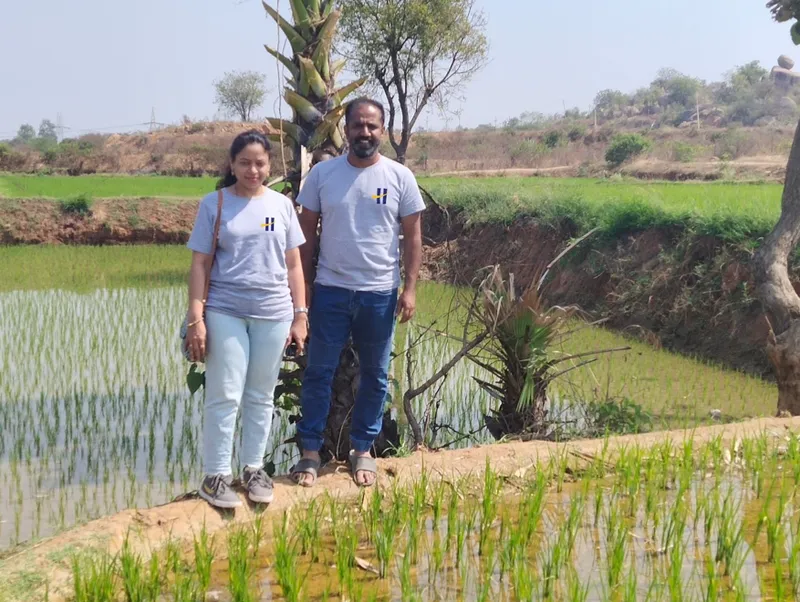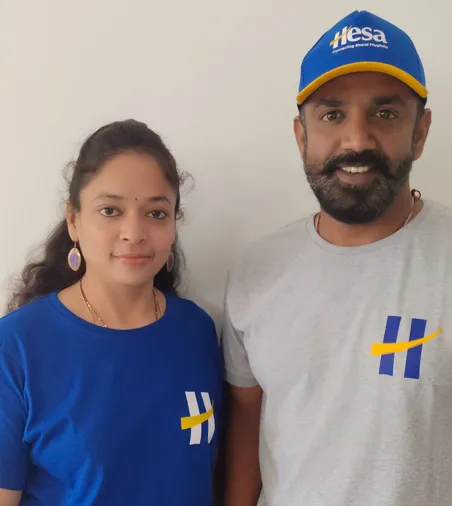Meet the woman entrepreneur behind rural phygital commerce platform Hesa
Hema Nandiraju, along with her husband Vamsi Udayagiri, started Hesa Technologies to bridge the rural-urban gap phygitally. By launching their product during the first COVID-19 lockdown, the couple leveraged tech disruption caused by the pandemic to help rural business owners access digital
Hyderabad-based Hema Nandiraju spent over a decade building a rural connect in Telangana by managing rural events, training and development. So when in 2019 her husband, Vamsi Udaygiri decided to start Hesa Technologies – a physical + digital (phygital) platform that bridges the rural-urban gap by providing access, enablement, and employment options to people residing in rural India – she was excited.
It was the right opportunity for her to showcase her skill of connecting with the grassroots and identifying its problems.
Hema was also not new to entrepreneurship and she had earlier founded two other digital platforms named Rural Yellow and Pakka Hyderabad.
Additionally, she had also worked with her husband as co-founder at Rural Yellow.
“I help people understand the challenges of working in the rural communities which now allow me to create solutions for rural problems,” Hema tells HerStory adding that received Rs 4,50,000 grant from NABARD (National Bank for Agriculture and Rural Development) to up-skill Self Help Groups (SHGs) in Odisha to increase women's participation at work with digital and financial awareness.

Hema Nandiraju and Vamsi Udayagiri, founders at Hesa Technologies
Hema calls Hesa the brainchild of her and her husband Vamsi. “We have been working together as business partners for more than a decade now. With our partnership together we have built several businesses together. The first was in 2012, Rural Yellow – an employment portal for rural youth,” she says.
“We have gained a lot of experience over the years by interacting with rural communities and developing a connection with them. The amount of time we have spent with rural communities has helped us understand their problems and insights of the community to find apt solutions,” she shares.
Hesa works with a variety of people, including local youth, senior people, delivery people, transporters, farmers, disabled people etc. Hesa calls them Hesaathis. Hema says that one of Hesa’s core philosophies is to provide equal opportunity to all and to cater to this, it also runs an initiative called Everybody can earn.
She notes that the tech-enabled commerce platform efficiently connects end-to-end business to the rural population at the doorstep. “With buying, selling, promoting, marketing, services all enrolled in one platform, Hesa has become the go-to-market solutions in rural India,” she adds.
Hesa claims to use a robust supply chain and consumer-friendly API (application programming interface) which helps in creating business opportunities in rural areas. The company currently operates across Telangana and is rapidly scaling in Maharashtra, Odisha, and Tamil Nadu as well.
“The company is leveraging rural entrepreneurship and offering dignified livelihood opportunities with the holistic development of rural communities,” says Hema.
Hesa claims to have grown from around Rs 3 crore in revenue in 2020 to Rs 32.9 crores in 2021. It has faced challenges in setting up the platform and building a certain trust level among its target audience. Hema shares that penetrating rural areas and bringing a tech-enabled platform there has been a consistent struggle.

Hema Nandiraju and Vamsi Udayagiri
“Convincing rural audiences to trust a digital platform for their business needs is nowhere an easy task because the majority of the population is not tech-savvy. It is difficult to find people with the right skills set that we desire. Our business model requires FOs to find village-level entrepreneurs to tackle this gap and reach the target of onboarding Hesaathi’s which also becomes a challenge,” Hema elaborates on her struggle.
Seeing the pandemic as an opportunity
The pandemic ravaged several small-scale businesses but Hesa took it as a challenge to help people access digital tools.
“We decided to launch the app earlier than what we had in mind amidst the pandemic because we were confident that our product can leverage a sudden lockdown. With technology integrated interventions, our model became a hit and we were able to help people with door-step access to products and services during the pandemic,” Hema shares.
She adds, “Within one year of our launch we were able to expand to multiple states, sign MoU with a government-led organisation and secure a seed fund of two million dollars. Rural Access Coalition –we partnered with two other rural tech start-ups to help combat the healthcare challenges of Covid-19 in rural India. The multi-level collaboration helped amplify support to rural communities via collective approach.”
Presently, Hesa works with 30,000 micro entrepreneurs called Hesaathi on their platform spread across 50,000 villages. It raised funds through a seed round led by Manish Modi of Mastermind Capital at Venture Catalysts (VCats) along with Accelerator Fund and 9Unicorns.
After allocating funds majorly to operations, marketing and technology, it has plans of going pan-India. In the revenue front, Hesa envisions a $5 million net revenue in FY 22. We plan to onboard 1.5 lakh micro entrepreneurs by the end of 2022, states Hema.
Finally, the entrepreneur who has launched more than two startups, Hema believes that it is not selfish to pursue your dream of building your own startup.
She says, “If you have the passion and the zeal to shape your dream, then you can challenge adversities and make them look like mere obstacles that you will cross with your persistence. I know there were times when I thought I had other priorities, but I did not let go of my dream of Hesa and now it is synonymous with ‘Tech Revolution of Rural India’.”
“A customer-centric approach for researching the market and your needs can solve their problems and help them in their daily routines. Technology should not be designed around an idea but to solve real world problems to make a change,” she adds.
Edited by Affirunisa Kankudti








